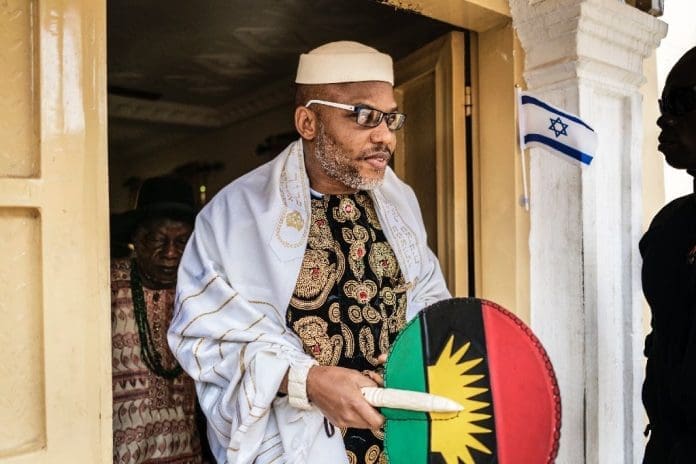Detained Indigenous People of Biafra leader Nnamdi Kanu has told the Federal High Court in Abuja he’s ready to open his defence, naming 23 witnesses including some of Nigeria’s most prominent political and military figures.
In a motion personally signed on Tuesday, October 21, Kanu informed Justice James Omotosho that he intends to call witnesses divided into two categories: ordinary but material witnesses and vital and compellable witnesses to be summoned under Section 232 of the Evidence Act, 2011. The IPOB leader’s decision came days after court appointed medical experts declared him fit to stand trial.
Among those listed as compellable witnesses are former Minister of Defence Gen. Theophilus Danjuma, former Chief of Army Staff Gen. Tukur Buratai, Lagos State Governor Babajide Sanwo-Olu, and Imo State Governor Hope Uzodinma. The list also includes Minister of the Federal Capital Territory Nyesom Wike, Works Minister Dave Umahi, and former Abia State Governor Okezie Ikpeazu.
Other high profile names include immediate past Attorney General of the Federation Abubakar Malami, former Director General of the National Intelligence Agency Ahmed Rufai Abubakar, and current Director General of the Department of State Services Yusuf Magaji Bichi, alongside several unnamed witnesses whose identities remain undisclosed.
Kanu stated in his motion that he would testify on his own behalf, providing a sworn account to deny the allegations and explain what he described as the political context of his statements and actions. The personally signed filing suggests he may have parted ways with his legal team previously led by Kanu Agabi, a senior advocate.
Requesting a 90 day period to conclude his defence, Kanu cited the substantial volume of evidence and number of witnesses involved. This contrasts with the court’s earlier directive granting only six consecutive days beginning October 23 for him to open and close his defence. He assured the court that sworn statements from all voluntary witnesses would be provided and the prosecution notified promptly.
“It would interest the honourable court and the public that justice is not only done but seen to have been done,” Kanu wrote in his submission. The motion came after the court ordered him on October 16 to commence his defence on October 24, 2025.
It remains unclear how Kanu intends to use testimony from these prominent figures in his defence strategy or whether the named individuals had prior knowledge of his plans to subpoena them. The IPOB leader faces terrorism charges stemming from what prosecutors describe as violence inciting separatist campaigns.
The prosecution, which closed its case with five witnesses in June, blamed killings and property destruction in Nigeria’s southeast on Kanu’s secessionist social media rhetoric. The trial has become one of the most closely watched legal proceedings in the country, with the separatist leader campaigning for the independence of the predominantly Igbo southeast as a sovereign Biafra state.
Kanu’s defence motion emerged the same day a magistrate court in Abuja ordered the remand of his special counsel, Aloy Ejimakor, and 12 others arrested during protests demanding the IPOB leader’s release. Police charged the 13 individuals with criminal conspiracy, disobedience of lawful order, inciting disturbance, and disturbance of public peace, offences contravening sections 152, 114, and 113 of the Penal Code Law.
The defendants, named in two separate first information reports, are Ejimakor, Kanu’s brother Emmanuel, Joshua Emmanuel, Wilson Anyalewechi, Okere Kingdom Nnamdi, Clinton Chimeneze, Gabriel Joshua, Isiaka Husseini, Onyekachi Ferdinand, Amadi Prince, Edison Ojisom, Godwill Obioma, and Chima Onuchukwu. After briefly standing down the case, the magistrate ordered their remand at Kuje Correctional Centre pending arraignment on October 24.
The protest, led by activist Omoyele Sowore, recorded poor turnout across major Nigerian cities. Many residents in the southeast cited concerns the demonstration could be hijacked by miscreants and noted the matter was already before the court. In Abuja, a small group of protesters who gathered near the Federal High Court complex were dispersed by police, leading to the arrests.
The timing of Kanu’s willingness to proceed with his defence, coming hours after the failed nationwide protest, marks what observers describe as a dramatic turn in the long running case. His previous motion challenging the court’s jurisdiction, filed just last Thursday, suggested a different legal strategy before this latest development.
With proceedings scheduled to commence Thursday, the case enters a potentially decisive phase. Whether the court will grant Kanu’s request for 90 days to present his defence, and whether all the named high profile witnesses will agree to testify, remains to be seen. The outcome could have significant implications for both the separatist movement and Nigeria’s approach to handling secessionist agitation.
Source: newsghana.com.gh











